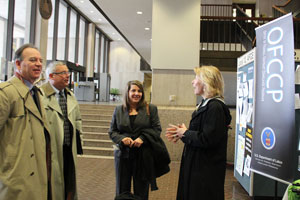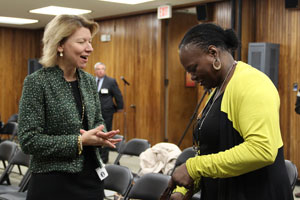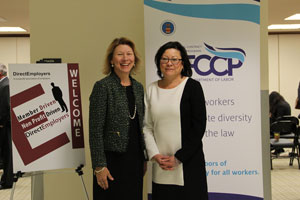DirectEmployers Association had the unique opportunity to work with key personnel in the Department of Labor’s Office of Federal Contract Compliance Programs (OFCCP) to conduct a listening session exclusively for Members. Moderated by employment law expert John C. Fox, senior partner at Fox, Wang & Morgan, P.C., this session featured the OFCCP’s Patricia Shiu, Director; Debra Carr, Director, Division of Policy, Planning and Program Development; and Naomi Levin, Branch Chief for Policy Development and Procedures, Division of Policy, Planning and Program Development.

John C. Fox, Tom Eckhart, me and Candee Chambers meeting up at the OFCCP prior to the listening session.
Since the majority of the almost 700 Member companiesof DirectEmployers Association are federal contractors, it only makes sense to work closely with the OFCCP. The goal for this session was to help dispel any misinformation that surrounds the OFCCP’s revisions to the Vietnam Era Veterans’ Readjustment Assistance Act of 1974 (VEVRAA) and Section 503 of the Rehabilitation Act of 1973 – which is significant for federal contractors so they can adjust their individual compliance strategies before the implementation date of March 24, 2014.
DirectEmployers Association, as well as several of our Member company representatives, received an incredible welcome at the OFCCP in Washington D.C. I had the privilege of attending in person, and was truly honored when we walked in the door to see a professionally printed welcome sign in the Department of Labor’s lobby, outside the door of the meeting room AND in the meeting room. (Thank you to Bernard for these signs and the warm welcome!)
About 10 of our Member companies were represented in person including Hilton, KPMG, Sodexo, Marriott, Northrop Grumman, Raytheon and Citizens Financial Group. In addition, over 300 of our Members eagerly participated by dialing-in to the session and listening via phone.
Candee Chambers, VP of Compliance and Partnerships for DirectEmployers Association kicked off the listening session by thanking Patricia Shiu, Debra Carr and Naomi Levin for hosting the listening session. Candee stated, “I think everyone realizes what these regulations mean for all of us and I think everyone’s nervous about getting it right and I think this is a great opportunity to help us do that.”
John C. Fox acted as moderator by asking questions that were submitted by Member companies prior to the listening session. John encouraged the participants to ask their questions as well.
“Thank you Candee both to those on the line and those here in the room today, we have several hundred attendees joining us. I’m delighted to be here for this very special meeting with OFCCP and DirectEmployers at the OFCCP,” stated John. “I just want to say this is extraordinary, this group and this administration getting together with the contractor community and to listen and adapt to the regulatory environment and the way you do business.”
John began by sharing two observations regarding what’s different about OFCCP today than when he roamed the halls two decades ago. “I remember being in this room many, many times, and there are two things that really commend the wisdom that Pat has demonstrated about having a listening session. The first thing that dawned on me is that industry is much more diverse and much more complicated than it ever was. This is really a challenge for a regulator. Today there are over a hundred industries, so Pat has to deal with that in a way that her predecessors never had to deal with, and it’s much more complex,” stated John. “The last five years it’s gotten so much more competitive in the marketplace that you all are doing business in ways you’ve never done before. And that’s the second thing that I think is different for Pat and Debra and Naomi as they confront regulations and how they address the regulated community, and that is HR is so thin right now. I’ve never seen HR as thin as it is today. Particularly, the last four or five years, you’re being asked to do more with less and often to do much with nothing. And Naomi and Debra, and Pat are aware of that and very sensitive to that issue and that’s why they want to listen to some of your concerns about how you will integrate the new regulations,” continued Fox.

Candee with Member Rosa Coppedge of Sodexo.
Pat Shiu stated, “Before I turn it over to Debra and Naomi, I wanted to thank my staff, especially Debra and Naomi who worked for four long, hard grueling years to bring this over the finish line along with everybody here at the Department of Labor.I also wanted to say that we very much, at OFCCP, appreciated all of your comments. And I hope that you know we took them to heart and we analyzed them over and over and had lots of discussions about them, and tried to balance a lot of competing demands. But when it came right down to it, what we decided was really important, the aspirational goals, the benchmarks, the accountability and the metrics. And two very wise women suggested to me that what business needed was flexibility.” Pat continued, “Give us the flexibility to do what’s best for our industry, our company to get there. Don’t tell us how to get there. That seemed to me to make a lot of sense and it really guided what we did in the final rule. But as with all other decisions here at the Department of Labor, they are evidence-based decisions, based on metrics, so this will be an exercise where you all will be collecting data and we will be collecting data for the first time to really see how we can achieve our mutual goal,” Shiu concluded.
John went on to ask the questions by topic, beginning with the general questions regarding preparations for the implementation date of March 24 – the date that the regulations become legally final. After that, he moved to the question of listing of jobs with the employment delivery service system (ESDS), while addressing some self-identification questions. Understanding it could be a runaway train, he had to limit the time spent on them. Here’s a recap of the key questions addressed by the OFCCP:
John: As Director of Policy Division can you give the audience a sense of how many employees you have working on the regs?
Debra: Not enough. So all this work, the FAQs, the writing of the regs, all the listening sessions, all the creation on our website now about resources available for outreach recruitment, change in corporate culture, best practices around disability issues in the workplace, how to recruit, attract and retain, veterans, all that work is really done by a very small staff. So in my division, as we print out the regs, we’re talking about 20 people. And those 20 people don’t all work on the regs. The actual work on the regs is done by me, Naomi, [and] one other staff member will help along the way with some others. We just kind of shuffle the chairs on a sinking ship. So, day-to-day basis, doing all this work, we’re talking three to four people.
John: When do you think you might have new FAQs – is there some sort of schedule or just whenever?
Debra: We were aiming to do FAQs on a rolling basis every couple of weeks. That has slowed because we’re doing more conversations, we have lists that we’re queuing up and we hope to get cleared next week, and even that process of rolling out an FAQ is not as easy as it may seem. We have conversations, we have meetings, phone calls we make choices about what needs to be on the short list, Naomi and I will start writing, we’ll flip back and forth, we listen to solicitors, they get to bless and clear, we keep Pat informed, we touch base with our colleagues in the operations side of the house.
John: It sounds like between now and March 24 we should look for a rollout of FAQs, we should look for more content-based webinars.
Debra: Yes and let me add two more things that we’re doing to help position you that you should be aware of. We have heard some contractors say they don’t know where the resources are for outreach and recruitment, they don’t know how to develop relationships with the organizations that would help them in that area, and so on our website we put up probably a month ago, some resources on those topics. We’re also working with VETS in DOL for more resources for veteran recruitment
John: I hope everyone is aware that VETS–the Veterans Employment Training Service–is another assistant secretary down the hall from OFCCP with whom OFCCP works closely on veteran’s issues.
Debra: And we’ve been working with the office of disability employment policy to shore up the information that we provide to you on disability rights in the workplace issues, and we’ve been working with our communications and outreach folks to enhance that employment resources referral directory that’s been on our website forever and ever and ever because we’ve heard some of you say that it’s not useful. You go and take a lead and it’s a dead lead. So we’ve worked on clearing that out. It is not perfect, but it’s better and it should get better as we move forward and it will be better the more I hear from you about how it’s working.
The last thing that I will say is our overall approach to working with you has shifted. This period of when we implement and train and support you in regulatory implementation is all about helping you succeed. In order to do that we came to you in a very constructive way and I think that’s what you should be experiencing. So to the extent that you have anxiety about what’s going to happen on March 24, what will happen after I do my first AAP, will I get this exactly right…I said before and I’ll say today, this is a transition for us all. So your first encounter with us on the first day is not going to be like you have to have all the I’s dotted and all the t’s crossed or else. No, all we want to do is go in and engage you, figure out what you have done, what you have not been able to do, give you assistance, to work with you, to get you where you need to be. We know there are going to be data limitations, so what we’re trying to do is work with you. You’ve got to demonstrate that you’ve done something, you can’t sit on your hands and say I just didn’t know what to do. This is a different approach to policy and to enforcement under these new regs.

Candee and Patricia Shiu, Director of the Office of Federal Contract Compliance Programs (OFCCP), outside of the listening session meeting room.
Naomi: I will just say if you miss any of our webinar trainings we are posting them after they are done so you can always go back and find them and listen to them and even watch them if you need them because they are resources and the questions that we get during webinars, we go through them, I go through them and look for good candidates for FAQs that we’ve seen over and over and we’ll go to Debra and say this issue keeps coming up a lot, maybe we need to sit down and develop an FAQ around it. Not only use those to train you, but to get information to help us help you again, kinda full circle.
John: Very helpful. If we could turn the discussion to job listings, now who in the employment service delivery system will see the job listings?
To access the remaining questions and answers, you need to be a DirectEmployers Member company. Members can access the full post in Pipeline. If you’re not a Member and want to learn more, please visit http://www.directemployers.org/become-a-member/ or call 866-268-6206.
